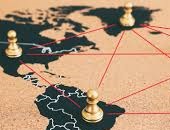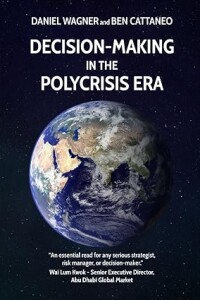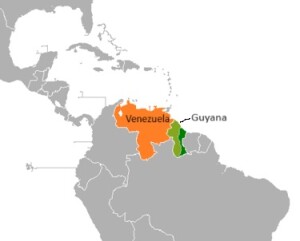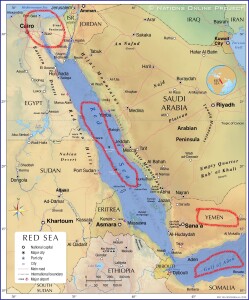Many conflicts and potential conflicts disturb various parts of the world in the post-pandemic era. For those who must manage various sources of risk in a portfolio, what are the biggest threats on the horizon? Is there a common thread among several sources of conflict? The Global Association of Risk Professionals (GARP) provides a series of podcasts featuring specialists discussing their area of risk and we at TextMedic enjoy listening in. This is the first podcast we have summarized in our blog, and for starters we delve into country risk.
On April 14, 2024, Daniel Wagner, CEO of Country Risk Solutions, sat down with Robert Sales, Editorial Director at GARP for an interview about current geopolitical risk. Wagner is the author of eleven books, including The America-China Divide: The Race to Control the World (2020).
Most recently, he has published Decision-Making in the Polycrisis Era (2024). Early in the interview, he defined what is meant by “polycrisis”: a term that describes the existence of multiple significant risks occurring at the same time.
Wagner outlined, in broad terms, how geopolitical risk affects investors, and went on to link it to other risks humanity is grappling with.
“Geopolitical risk magnifies the uncertainties,” said Wagner. “The risk managers become more risk averse.” He said the situation is often mixed—to paraphrase, there can be safe investments in high-risk countries and high-risk investments in countries considered to be low risk.
Robert Sales referred to a recent risk survey by GARP Benchmarking Initiative (GBI). One of the top three risks identified was cyber risk.
Wagner tied cyber risk into geopolitical risk, noting that “Geopolitical risk can be multilayered.” Things that weren’t on the established analysts’ dashboards a few years ago have now become the biggest risks. Technology such as the recent growth of artificial intelligence (AI) has changed geopolitical risk by “adding to the unknowns” through things such as deepfakes. “If we don’t get a grip on it, AI will spin out of control.”
“The table has been set,” Wagner said, and things will become “more perilous in the next 12 months.”
He said 2024 could become a “dangerous year” due to the number of simmering conflicts threatening to flare up. Myanmar has troubles; Haiti is in chaos; and there is potential conflict between Venezuela and Guyana. “World War Three has not broken out yet but…”
Wagner summarized the risks he sees for four troubled areas: Ukraine, Gaza, Yemen, and Taiwan.
Wagner sees a “continued stalemate” in the Russia-Ukraine conflict while Ukraine waits to have more funding approved by the U.S. government. And if the U.S. does not approve increased funding to assist Ukraine, “Europe will have a hard time with a hole in the funding.” In his opinion, “Russia will turn to Iran. This means more suffering for a lot of people.”
Wagner predicted that by summer, Israel would end its operations in Gaza. “Israel will be unsuccessful in decapitating the Hamas leadership.” He thought that “Iran may choose to escalate.” As well, he said that “direct conflict between Israel and Iran cannot be ruled out.”
[Side note: The Yemeni civil war began in late 2014 mainly between the Presidential Leadership Council and the Supreme Political Council, under two different leaders representing two different Islamic sects. Both claim to constitute the official government of Yemen.]
Recently, Yemen-based Houthi rebels have struck at least three ships in the Gulf of Aden. This is part of the shipping route through the Suez Canal and is the shortest maritime route between Asia and Europe, with about 15 percent of global maritime trade volume normally passing through it. (For reference, the map below shows these four named places.)
Wagner predicted, “The damage done to ships in the Red Sea will lessen as shippers seek to use other routes.” He said this would lead to delays and rising prices. Many people had not heard of the Houthi tribe (approx. 200,000 members) until the Red Sea conflict. Their strategic interference with global shipping patterns signals that “minor forces have proven they can have an impact on the world stage.”
The relations between China (officially the People’s Republic of China, PRC) and Taiwan (officially the Republic of China, ROC) continue to be a source of instability as Taiwan asserts its independence and China wants to unify it.
Regarding Taiwan, Wagner said, “There’s unlikely to be an attack by China” this year, but “it’s possible in 2027, when Xi Jin-Ping has ordered forces to be ready to invade.”
Wagner said he thought China was more likely to use tactics such as a long-term economic blockade or cyber-attacks. But, for the moment, he predicted there would not be a major move. “The stakes are too high.”
The snapshot of conflicts and country risks occurs against a backdrop of climate change that is disrupting the normal patterns of nature and agriculture. Water scarcity and hunger will exacerbate international tensions. ♠️
Click here to see the list of GARP podcasts on risk.
Click here to listen to this podcast, an interview with Daniel Wagner on April 14, 2024.
Click here to visit Daniel Wagner’s Country Risk website.
The Venezuela-Guyana map is from Wikipedia – Aquintero82, CC BY-SA 4.0 <https://creativecommons.org/licenses/by-sa/4.0>, via Wikimedia Commons.
The Suez-Red Sea-Gulf of Aden map is from the website Nations Online.










